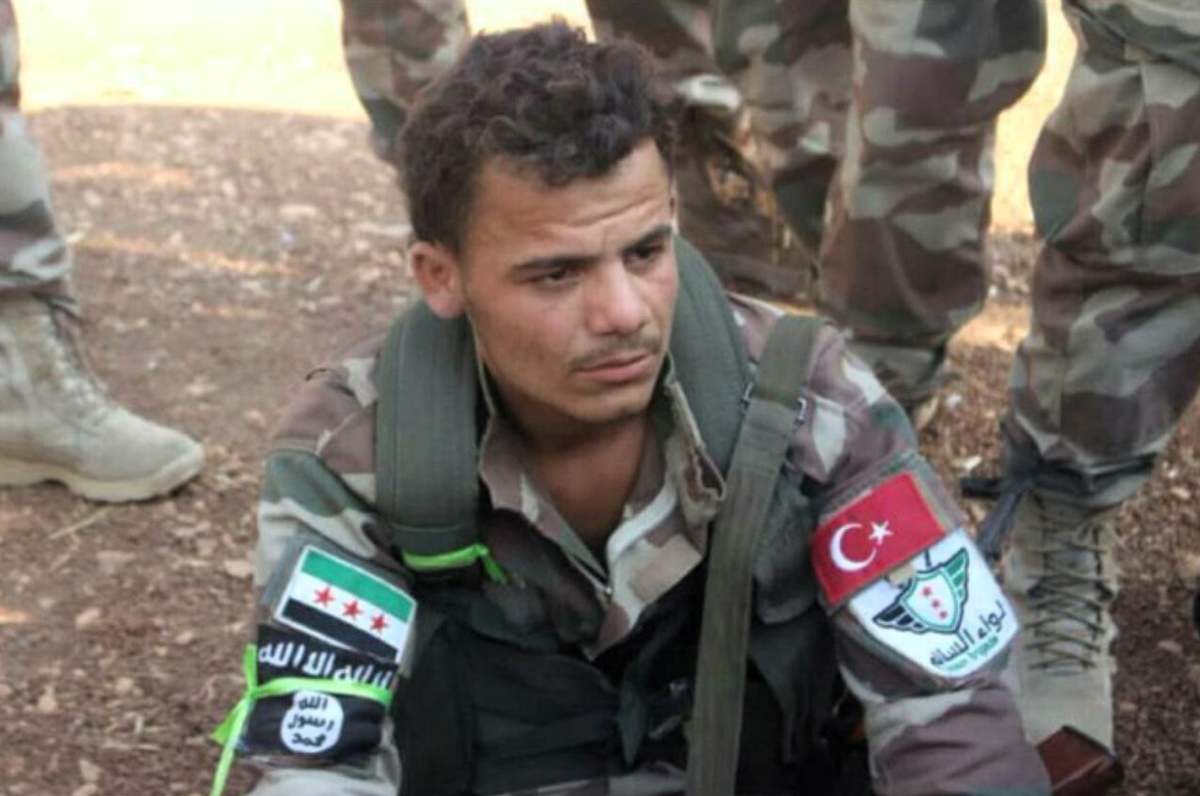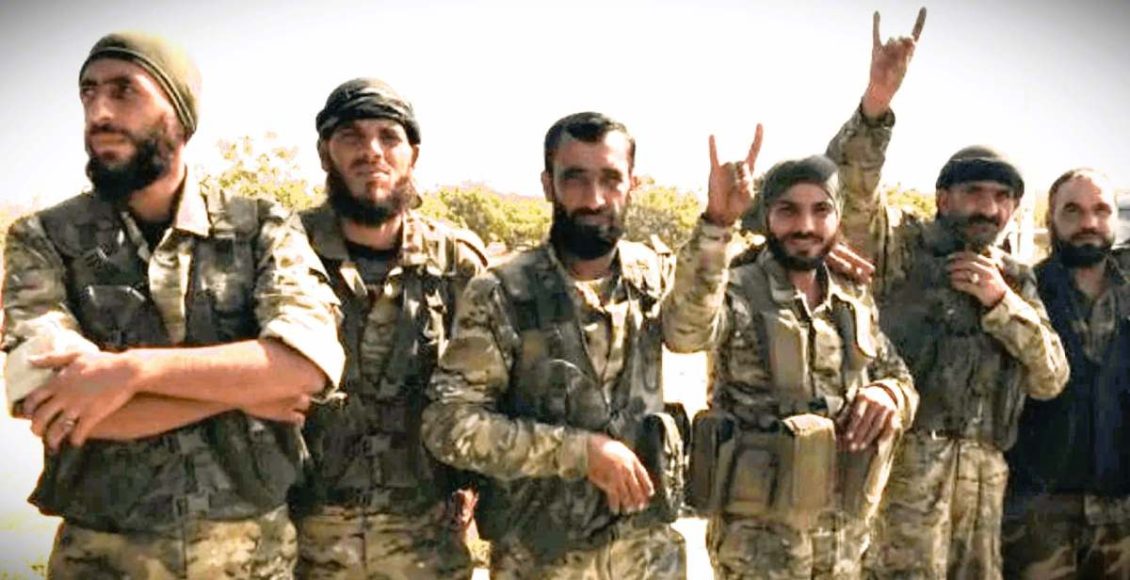Turkey’s Unofficial Military: Mercenaries & Jihadists
By Dr. Hawzhin Azeez
“To plunder, butcher, steal, these things they misname empire: they make a desolation and they call it peace.”
— Tacitus, Roman historian (56-120 AD)
Turkey’s growing geopolitical influence has contributed to the further destabilization of regional balances, deepening of conflicts, and promotion of extremism. In the Neo-Ottoman quest to increase their reach, Turkey has established an array of proxy mercenary organizations and Salafist terror groups, who are hired and supported by Ankara to engage in hot conflict zones and promote Turkish geopolitical interests.
Turkey’s use of mercenaries and proxies developed exponentially through the Syrian Civil War, where it began interference and efforts to politically and strategically maneuver the conflict in its own favor. Ankara instantly established strong connections and networks of support for the various “Syrian” rebel groups (staffed with recruits from across the globe), which has served its geostrategic aspirations extensively. Not only has Turkey used these rebels and various jihadists groups against Kurds and forces in the AANES region, but it has also continued to reap massive geopolitical rewards in continuing to fund and recycle them through a number of ongoing conflicts abroad. The more violent and abusive the rebels towards Kurdish civilians and forces, the more ongoing contracts, financial support, and other benefits the rebels have reaped. In the same vein, Ankara has engaged in similar tactics with terrorist organizations such as ISIS, al-Qaeda, al-Nusra, and Hayat Tahrir al-Sham (HTS), in their unremitting war against the Kurds across Greater Kurdistan.
An additional aspect of the rise of Turkey’s regional geopolitical power is its utilization of Syrian mercenaries in a number of hot spot wars, including Azerbaijan’s assault on Artsakh, as well as in Libya. Previous to the Syrian conflict, Turkey relied heavily on trade and diplomatic relations to strengthen its connections both with Europe as well as within the Middle East. However, the rise of the Arab Spring back in 2011, the Syrian civil war, and Ankara’s growing anger at Kurdish empowerment in Rojava, has resulted in a shift towards hard-power policy. This aggressive posture has proven to not only be strategically rewarding, but also established Turkey as an indispensable and rising global influencer in a number of conflicts.
As proof of that growing power, Turkey’s open support for ISIS, which repeatedly set back the global coalition’s fight against terror for years, was met with almost total Western silence, ostensibly in exchange for Ankara hosting close to 4 million Syrian refugees. Furthermore, global acquiescence was followed when Turkey invaded and occupied the Afrin region in 2018 and immediately began to displace the indigenous Kurdish communities and replace them with Arab refugees, including the families of Syrian rebel fighters it had funded for years against the Kurds.
More recently, Ankara’s growing power was seen in vetoing Sweden’s bid to NATO, until the US Biden administration signed a lucrative F-16 fighter jets deal – aerial weapons of terror which it freely utilizes against Kurdish civilians across Syria and Iraq.
Syrian Fighters Hired by Turkey
In 2020, as a sign of Turkey’s growing appetite for regional power, Ankara deployed over 1,000 battle-hardened Syrian mercenaries recycled from the ongoing conflict in Syria to Azerbaijan as the conflict over Artsakh (Nagorno-Karabakh) began to escalate. From the very start, Ankara was open in its support for Azerbaijan contributing to further destabilization of the fragile situation in the Caucasus. Turkey has also engaged in extended military drills and exercises to strengthen and better prepare the Azerbaijani army in its ongoing conflict with Armenia.
Unequivocally establishing his support for Azerbaijan in the worst escalation of conflict since 1994, Turkey’s dictator Erdoğan supported the ethnic cleansing which is now underway, when he stated boldly that: “As Turkey, with all our means and with all our heart, we stand with fellow and brother Azerbaijan and we will continue to stand with it… God willing, until Nagorno-Karabakh is liberated from invasion, this struggle will continue.” Turkey’s direct support to Azerbaijan in the form of drones and weapons technology has further added to the terror imposed on the Armenians in Artsakh and their mass exodus earlier this week.
Of course, this “liberation’ was assisted with Turkey’s jihadist mercenary forces, who were flown in from Syria where they committed an assortment of brutal war crimes in Artsakh. In missions like these veteran Syrian rebels are being given an astonishing sum of 10,000 Turkish lira (£1,000) a month, as incentive to participate in a number of Turkish backed conflicts. In the Caucasus, some have been offered three to six month contracts to act as border guards, while others have been deployed directly into active conflicts, while others have been placed at observation posts to protect resource facilities such as oil and gas stations. As a result, Syrian fighters have been seen in Artsakh wearing blue Azerbaijani border guard uniforms.
Many of the fighters are hired from Idlib (which Turkey runs in conjunction with al-Qaeda’s off-shoot HTS) and are recycled from the battled-tested Turkish backed divisions including the Suleiman Shah Brigade, Sham Legion, Sultan Murad Division and al-Hamza division as well as other factions within the supposed Syrian National Army (SNA). Of note, the majority of these factions have been accused of grave human rights violations against Kurdish civilians and groups in Syria, including in the Turkish annexed region of Afrin.

These mercenary fighters frequently travel across the Syrian-Turkish border, especially the Hawar Kilis crossing into the Turkish city of Gaziantep (which was also the previous chief destination in Ankara’s “Jihadist Highway” of ISIS fighters, where they shuttled from Istanbul into Syria). In the current cases, an unknown number of fighters remain in Turkey and undergo extensive military training in southern Turkey military bases.
Despite ample evidence to the contrary, both Azerbaijan and Turkey have denied claims that Syrian mercenaries are active in Artsakh. Instead, both have absurdly claimed that the Armenian Government has deployed Kurds from Rojava (northern Syria) and Southern Kurdistan (northern Iraq) in the conflict. Of course, there has been no evidence provided to prove such a claim by Ankara and Baku, as it typifies a classic case of psychological projection (accuse your opponent of exactly what you are doing).
Contesting Russia’s Power
Additionally, Turkey’s growing regional involvement has come in direct conflict with Moscow’s traditional sphere of influence. From Syria to Libya and more recently to Artsakh, Turkey is increasingly visible in its involvement.
In the Caucasus, Turkey has a long-established history of economic and cultural connections with Azerbaijan. In contrast, Russia has a more established connection with Armenia, though without severing relations with the ruling political elite in Azerbaijan. Concurrently, Moscow engages in arms sales to both sides, playing an old Realpolitik game.
Overshadowing Russia, Turkish participation and involvement in Libya has drastically changed the tide of the conflict between the government and the rebels led by the general Khalifa Haftar. Turkey’s Syrian mercenaries have managed to shift the conflict in favor of the Turkish-backed Government of National Accord (GNA). Meanwhile the Moscow-backed Haftar rebels continue to remain in the conflict and pose an ongoing albeit perhaps waning threat to the GNA. Along with Turkey, Qatar and Italy have provided extensive support to the GNA.
Moscow has responded by sending several thousand Sudanese fighters to Benghazi in support of General Haftar. Hundreds of Russian mercenaries were already present in Libya in support of the rebel groups. As a display of the geopolitical complexity, Haftar is supported by Egypt, Jordan, UAE, France, and the United Arab Emirates.
The parameters of many of these conflicts are expanded, perpetuated, or deepened further as a result of Turkish regional aspirations and contesting Russia’s supremacy. According to experts, Ankara’s utilization of Syrian proxies “means that Ankara can avoid its own troops potentially clashing with Russian mercenaries.”
Syrian Fighters in Libya
In Libya, there are indications that Turkey has recycled and rotated up to 16,000 Syrian mercenaries in the ongoing conflict. The majority of the mercenaries are rebels within the Syrian National Army (SNA).
Turkish support of the Libyan government and its recycling of Syrian mercenaries comes under the auspice of the UN, who provides ongoing support to the GNA. Similar to the rebels who would later flow on from the Hawar Kilis border crossing, the Syrian rebels were flown by Turkish military planes directly to Tripoli where they were immediately posted on the frontlines.
In Libya, the fighters have signed contracts with the UN-backed GNA rather than directly with Turkish firms. Sources state that some fighters are earning as much as $2,000 (£1,500) a month when the average monthly salary at the time in Syria was 450-550 Turkish lira (£52-£72). Additionally, in conjunction with the large sums of funding, Ankara has promised Turkish citizenship to the mercenaries if they continue serving for an extended period of time. Likewise, Turkey foots the bill for medical expenses and injuries of the soldiers, while also repatriating the bodies of the dead mercenaries back to Syria.
At the Center of the Chaos
Turkey’s geographically privileged position, straddling Europe and Asia, plus the Black Sea and the Mediterranean, allows it to play an important role in regional conflicts, economic relations, security decisions, and political shifts. Its growing strategic position and influence has resulted in a significant shift towards hard power, which Ankara has enacted and continues to promote in a number of strategic situations.
The role Ankara has played in the Middle East, Africa, and the Caucasus has been one of deliberate destabilization, fomenting further conflict, ethnic cleansings, and sponsoring of Islamist terror groups. Turkey’s mercenaries are continually deployed to achieve Turkey’s geopolitical whims, creating a dynamic that wherever the Turkish flag goes, death, misery, and exodus soon follows. Such trends indicate increasing effectiveness and influence, but also Erdoğan’s hiring of “every Takfiri Salafist” group in the Middle East as his own personal assassins spells future disaster for Kurds and the wider region. These mercenaries go wherever he instructs and kill whoever he wants eliminated, all the while allowing the official Turkish military to pretend to be uninvolved.
All recent trends highlight that Turkey will continue to play a detrimental role for stability that exacerbates conflicts and increases human rights abuses. Thus, all of those who desire peace and democracy should be alarmed and take action, before Turkey sows even more despair and destruction across their expanding sphere of influence. Turkey’s money to hire murderous enforcers of their foreign policy will not run out, so the question that remains is will the patience of the West for their atrocities also be as endless?




Comments are closed.